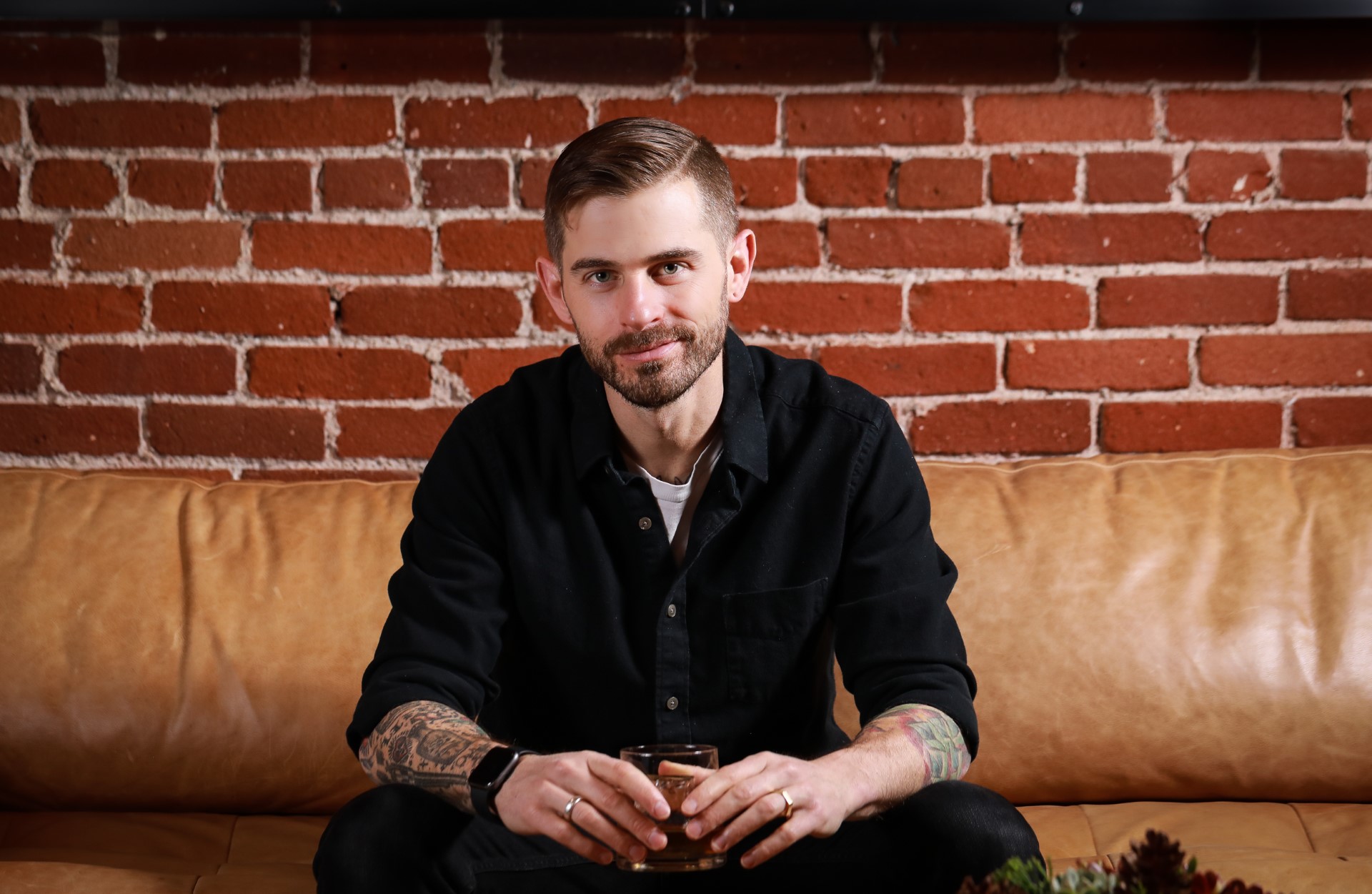As the Bar and Restaurant Expo approaches, we recently caught up with David Kaplan, co-founder of Death & Co., along with various other remarkable establishments. Our conversation revolved around his upcoming involvement in the convention. We delved into his path to the hospitality sector, his triumphs in the ever-evolving food and beverage landscape, and his vision for the Bar and Restaurant Expo seminars he is involved in. Here are the highlights of our discussion:
CHILLED: Tell us a bit about your 20-year background in the industry. How did you get started and what led to the establishment of Death and Co and your other notable ventures?
DK: There’s so much to cover in that story. Let’s see, how did it all begin? I started by pursuing fine art in college. Hospitality has been my primary focus since I was young, influenced by my dad’s belief in its character-building nature. My dad, a food enthusiast, instilled in me a love for culinary arts. Meanwhile, my mom, a pharmacist, harbored artistic aspirations. Unknowingly, I merged their dreams by studying fine art and immersing myself in the hospitality realm. After college, craving a more defined path to success compared to the uncertainties of an artist’s career, I ventured to Las Vegas to work at the NINE Group and Rain Nightclub. This experience served as my personal journey of self-discovery, akin to a college graduate’s European exploration. Despite the lack of a clear role at NINE Group initially, my dedication and curiosity led me to absorb as much as I could about hospitality. During downtime, I devoured business, bar, and cocktail literature, jotting down insights on customer preferences and operational efficiencies. While Vegas and nightclubs weren’t my long-term fit, the exposure taught me about my true passions. Eventually, I made the bold decision to move to New York, driven by my profound love for the cocktail culture. Growing up with a fascination for spirits and cocktails, I found them to encapsulate history, culture, and human stories. Arriving in New York, I was determined to launch my own establishment. With a modest inheritance from my late grandmother, I partnered with Ravi Derossi to establish Death and Co. At 24, we embarked on this venture with no prior experience, learning and evolving nightly alongside our team. The clarity gained from my Vegas escapade and life experiences empowered me to create a place that resonated with my vision – Death & Co.
CHILLED: Death & Co. has been operating for 18 years. What significant changes have you noticed in the hospitality industry from when you started to the current industry landscape?
DK: One of the most noticeable differences in the cocktail scene is the need for diversification.
Initially, our focus was solely on excelling in one aspect, which sufficed back then. However, this approach is no longer adequate. Unlike before, now you must be adept at marketing. Initially, we didn’t prioritize marketing, PR, or social media as they weren’t as prevalent. We were obsessively dedicated to perfecting our craft and presentation. Yet, this is insufficient nowadays. You must have a well-rounded strategy. You need to define your brand identity precisely and integrate it consistently. The core remains the same, but now, success demands a sharp focus on marketing, branding, social media, and maintaining a strong business ethos. Leadership, entrepreneurship, and operations must align seamlessly to excel. This level of cohesion was not as critical in the past. The cocktail industry has evolved into a more global phenomenon, requiring extensive marketing efforts to be noticed and remain relevant. Bars now engage in tours, host pop-up events, and strategically promote themselves through various channels, including books. For example, establishments like Double Chicken Please in New York employ innovative culinary techniques and prioritize team-building by organizing retreats. This corporate approach to staff management is becoming more common. Operators and business owners face heightened expectations today, particularly in meeting staff demands for engagement, recognition, career growth, and benefits. This accountability drives us to create better businesses, which in turn benefits customers through enhanced experiences and service quality. The dedication and engagement of a happy team translate into exceptional service and products for guests.
CHILLED: This leads me to my next question, regarding your seminar “Feast to Flourish: Navigating Food and Beverage Partnerships for Business Growth,” set to be presented at the Bar and Restaurant Expo. Could you share with us what attendees can anticipate from this panel discussion?
DK: Absolutely. This panel is quite thrilling. It primarily revolves around management deals, exploring their nature, benefits, and distinctions from traditional partnerships. Although we commonly refer to them as “Partnerships” in public, they offer various advantages beyond standard partnerships. They require no upfront capital and offer significant rewards in terms of brand growth and capital. We will delve into a range of deal types, from full stake ownership where 100% of the capital is provided by you, to more progressive arrangements where the developer contributes a portion of the capital, and you invest a smaller amount or none at all. The discussion will also touch upon consulting, licensing, and management deals. However, our main focus will be on management deals, as we view them as versatile avenues for growth. One of the key attractions of management deals is that they do not necessitate an initial capital investment. In fact, you receive compensation for their development without assuming the liabilities or operational costs directly. For instance, if there are accidents or injuries, the responsibility does not fall on you or your insurance. The staff is not technically your employees, yet the brand is typically yours. While there are downsides to consider, we will navigate through the full spectrum, providing real-world examples and detailing the pros and cons of each type of deal. We will also discuss how these deals manifest, primarily within hotels, but also explore opportunities beyond the hotel sector. I am co-hosting this seminar with a close friend named Kong, who has a background in PR and strategic partnerships at ACE Hotels. ACE Hotels boasts an impressive track record of unique partnerships, collaborations, and management deals with a diverse range of F&B professionals. Our aim is to deliver a practical and informative session, offering clear insights and actionable strategies.

CHILLED: What are you most looking forward to at the Bar and Restaurant Expo? Will you be participating in multiple seminars or talks?
DK: Following the panel presentation, I will be hosting another talk just 15 minutes later! It’s a 2-hour workshop, which sounds quite intense. I am the final speaker of the day in the Startup Essentials Bar and Restaurant Boot Camp, a full-day event scheduled for Monday from 9 am to 5:30 pm. My session focuses on “Creating the Guiding Principles for you and your Business.” I have carefully thought about this workshop and aim to deliver maximum value rather than merely filling the time slot. The workshop primarily revolves around defining your purpose and core values, starting with you as an individual, not your business. It delves into how this process shapes your business’s purpose and core values. From there, we move on to drafting your entire Entrepreneurial Operating System (EOS) and Vision Traction Organizer (VTO), which serve as the foundation for setting your 3-year, 5-year, and quarterly goals. Understanding and identifying your purpose and core values form the cornerstone of any entrepreneurial journey. This foundational step can be transformative and is crucial for any business, especially in the hospitality industry, to resonate and succeed authentically. The most successful businesses are authentic reflections of their entrepreneurs. Knowing your core values is essential, as it influences building an effective marketing plan, attracting exceptional staff, and creating engaging programs. By aligning these elements with your true self, your business can thrive. I am genuinely enthusiastic about this workshop as it aligns with a topic I am passionate about. While I cannot guarantee the entire 2-hour duration will be filled, I promise it will be interactive, engaging, and enjoyable. We will provide paper and pencils for hands-on activities during the session. My goal is for everyone to leave with a solid start on this important work and the realization that making this a habit can propel them far ahead in their competitive field.
CHILLED: This brings me to another question– what are some key tips for successfully managing a beverage program? I believe you touched on that in the previous question.
DK: Absolutely, there are numerous specific tips for running a successful beverage program, but I believe the most crucial aspect is understanding your identity and putting in the effort. Once you have a clear view of who you are, the next step is understanding the identity of your business. From there, the beverage program should naturally fall into place. For instance, if the vibe is light-hearted and playful, you may incorporate fun shots, creative sidecar options, or other celebratory elements. The structure, tone, and scope of the beverage program should reflect the essence of the business and your own identity. This approach can make the process more enjoyable and streamlined. Nickel City serves as a prime example of this philosophy. Travis Tober knows who the fuck he is and his strong self-awareness influences every aspect – from his team and hiring practices to the overall atmosphere of the bar. People are drawn to the establishment because of the fun and vibrant energy exuded by him and his team, making the entire experience enjoyable and engaging.
CHILLED: Discuss with us about launching a bar or restaurant today and what’s essential to understand.
DK: My top advice is to truly understand yourself, a point I’ve emphasized and will delve into at the Bar and Restaurant Expo. Without self-awareness, all efforts and plans are futile. It all remains theoretical and hypothetical. Without self-awareness, no practical progress can surpass that lack of knowledge. So, I believe this is crucial. Another significant piece of advice, besides starting with yourself and understanding your purpose, is recognizing when you face a “who” challenge, not a “how” challenge. You don’t have to be the solution to every problem. It’s important to acknowledge your strengths and weaknesses. For instance, I know I’m not equipped to be a bartender, so I hire someone with that expertise. Recognizing your limitations and hiring the right individuals to address your weaknesses is crucial. Trying to master everything will only slow you down. If you have a brilliant concept but lack a certain skill set, partner with someone who has it or hire a professional. As founders and entrepreneurs, we often feel the need to be proficient in every aspect, but this approach can lead to failure. By being passionate, confident, and clear about your vision, you can attract others to join you. Passion and confidence stem from understanding your core values, purpose, and goals. This formula, although seemingly straightforward, requires dedication and hard work to execute but can lead to purposeful and linear progress.

